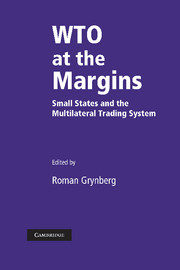Book contents
- Frontmatter
- Contents
- List of figures and appendices
- List of tables
- List of contributors
- Introduction
- Part I Theory and evidence
- 1 A theory of trade and development of small vulnerable states
- 2 Small countries: a survey of the literature
- 3 When comparative advantage doesn't matter: business costs in small economies
- 4 Can small states compete in manufacturing?
- 5 The economics of isolation and distance
- 6 The trade performance of small states
- 7 Small economies and special and differential treatment: strengthening the evidence, countering the fallacies
- Part II WTO and small economies
- Part III WTO dispute settlement
- Part IV Negotiating issues and institutional arrangements
- Index
3 - When comparative advantage doesn't matter: business costs in small economies
Published online by Cambridge University Press: 05 May 2010
- Frontmatter
- Contents
- List of figures and appendices
- List of tables
- List of contributors
- Introduction
- Part I Theory and evidence
- 1 A theory of trade and development of small vulnerable states
- 2 Small countries: a survey of the literature
- 3 When comparative advantage doesn't matter: business costs in small economies
- 4 Can small states compete in manufacturing?
- 5 The economics of isolation and distance
- 6 The trade performance of small states
- 7 Small economies and special and differential treatment: strengthening the evidence, countering the fallacies
- Part II WTO and small economies
- Part III WTO dispute settlement
- Part IV Negotiating issues and institutional arrangements
- Index
Summary
Background
For a small economy in isolation, the most obvious economic constraint is scale. With a small market, small scale would follow, and with it, almost inevitably, inefficiency in the rate at which inputs can be transformed into outputs. In seeking to identify the disadvantages of smallness empirically one would need to consider minimum efficient scales and look at differences in production functions and overall efficiency across different sized countries.
The problem addressed in this chapter is rather different. We consider a trading economy in which in principle the scale problem can be obviated by tradingwith the rest of theworld. Imports can be purchased fromtheworld's most efficient producer (or, at least, at prices dictated by that producer), while exporting to a huge world market allows an economy to reap full economies of scale in export sectors. The potential problem now is that trade with the rest of the world is more costly for small and remote countries. Because of a mixture of small consignment size, poor infrastructure, a lack of competition and weak regulatory arrangements, small countries costs of trade may be inflated, and so the physical cost of goods and services in small economies will always exceed world minima. (By physical cost we mean the inputs required to deliver a unit of consumption measured in physical terms.) Either consumers need to fund the costs of importing in addition to the minimum price of the good in world markets, or the trading cost of importing will be so great that local production is preferable, in which case local scale re-emerges as the constraint.
- Type
- Chapter
- Information
- WTO at the MarginsSmall States and the Multilateral Trading System, pp. 74 - 107Publisher: Cambridge University PressPrint publication year: 2006



